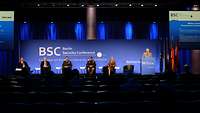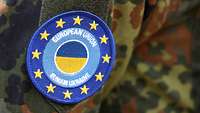Berlin Security Conference
Berlin Security Conference
- Date:
- Place:
- Berlin
- Reading time:
- 1 MIN
From 28 to 29 November, about 140 representatives from politics, industry and the military convened at one of the most important security and defence policy events – the Berlin Security Conference. Views on current issues and challenges were exchanged under the slogan “Europe and NATONorth Atlantic Treaty Organization – Boosting Resolve and Resilience”.
At a time when international security is facing historical challenges, it is crucial for Europe and NATONorth Atlantic Treaty Organization to strengthen resolve and resilience to ensure peace and security. In addition to the Middle East conflict and the military and foreign policy in the Indo-Pacific region, one of the main topics was the ongoing war in Ukraine, which significantly influences the security situation throughout Europe.
In a separate panel session, Lieutenant General Andreas Marlow, commander of the Special Training Command, was given the opportunity to speak about the experience gained from cooperating with the Ukrainians. A discussion on military support addressed the argument that there is no alternative to demonstrating the greatest possible commitment if we want to continue living in peace. General Marlow later emphasised the crucial importance of multinational cooperation in fulfilling this complex task.
In addition to the EUEuropean Union Military Assistance Mission in support of Ukraine with military contributions of 24 nations, training of Ukrainian soldiers is also supported by the USA, together with partner nations, through their “Security Assistance Group Ukraine”. Great Britain, too, has provided training to approximately 30,000 Ukrainian soldiers since the beginning of the war with its Operation Interflex, which focuses on basic training and initial capabilities. The training provided by the Multinational Special Training Command in Germany, by contrast, focuses on in-depth special capability training. This includes training on weapon systems which will subsequently be delivered to Ukraine, or brigade staff training.





